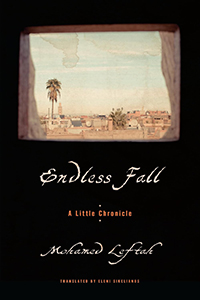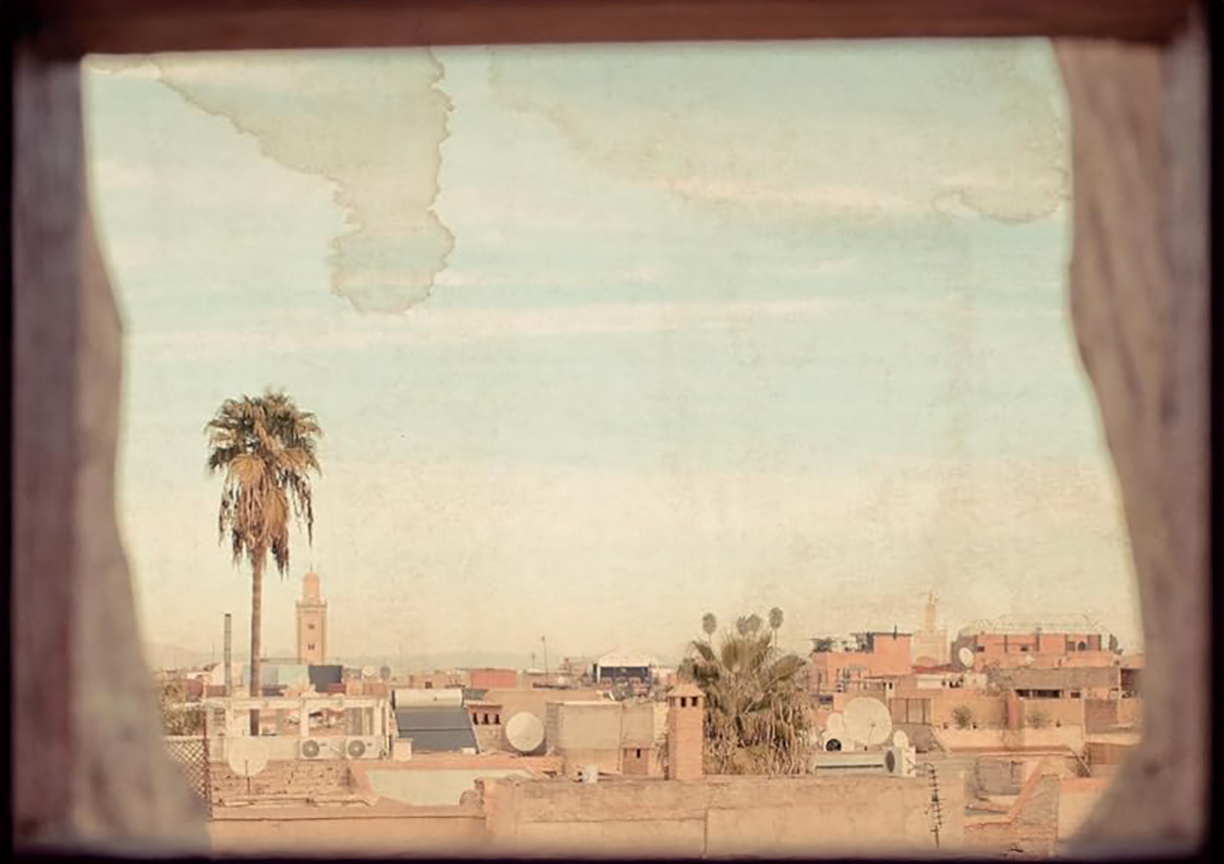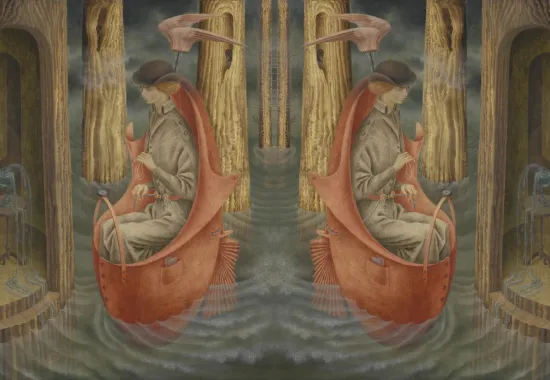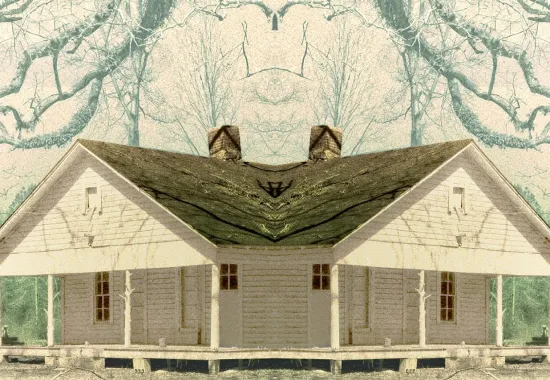A Review of Endless Fall: A Little Chronicle By Mohamed Leftah, translated by Eleni Sikelianos
On an ordinary day in an ordinary village in 1960s Morocco, Khalid, a student, a soccer player, a young man experiencing the first flushes of attraction and sexuality, leaps to his death from the balcony off the history classroom to the shock and disbelief of all present. In a note left for the beloved history teacher to read aloud, Khalid asks for his mother’s forgiveness and wishes his soccer teammate, and perhaps romantic interest, eternal happiness. Following the devastating act, a language teacher at the school denounces Khalid, condemning him to eternal damnation for choosing to die by suicide, a sin forbidden by the Koran.

Other Press, 2024. $15.99
Moroccan writer Mohamed Leftah was one of the students who witnessed the tragic death. In Endless Fall: A Little Chronicle (Other Press, 2024), he draws on his memories of that day, recasting and transforming the event into a haunting, elegiac meditation on loss. The novella is set in Settat, about an hour’s drive south of Casablanca, where Leftah was born and spent his childhood and early teen years. At that time, Settat, as described in the novel, was “nothing more than a tiny village dozing like a lizard under an unchanging blue, sunlit sky.” Until the suicide, the “faithful seasonal fires” and “unpredictable floods” were the only events that “startled it out of its lethargy.” Leftah movingly illustrates the psychic damage that can be inflicted by a conservative society that doesn’t accept certain forms of love and sexuality, and how that censure and repression isolates one young man, to ruinous effect, in his anguish.
Published as a fictional novella composed of short entries, some just a few paragraphs, Endless Fall lies somewhere between fiction and memoir. The fiction comes in Leftah’s effort to understand and imagine why Khalid behaved as he did, ending his life and choosing the message he left behind. Using the narrative to explore questions without answers, Leftah turns to metaphor, intuition, poetry from Rilke and Rimbaud, imagined fictions, and quantum physics to speculate, explore, and consider the overwhelming feelings that could be twisted into the unbearable and unspoken burdens that led to Khalid’s suicide.
The brief, sixty-page novella, told in short chapters, skips forward and backward in time, circling the events leading to the suicide, repeating and recharacterizing the moment Khalid “gathers speed in two dancing steps and leaps over the railing.” Leftah replays the critical moments from that fateful day, coloring in the scenes with poetic, impressionistic detail to mourn the loss, celebrate a life, and raise a prayer, “the prayer that he [Khalid] was refused.” He wants to rewrite and revise the language teacher’s damning words, “to take those powdery white figures written that day on the blackboard that fell like an avalanche on an already broken body, and scatter them to the winds.”
Leftah, who died in 2008 at sixty-two, began his career as a computer science engineer before transitioning into roles as a cultural journalist and literary critic, eventually becoming a celebrated author of nearly a dozen novels in French, first published by Les Éditions de la Différence. His subversive, poetic work frequently explores gender and sexuality in the Arab world and the West, and has been compared to Jean Genet and Baudelaire.
Endless Fall is a more tender, melancholy text compared to some of his earlier works, which are often marked by rage and intensity. Ghada Mourad, who teaches at the University of California, Irvine, has written extensively on the writer and his work. “Leftah has no fear of breaking taboos. All his texts criticize established institutions in sublime language while also criticizing language itself. He shows again and again that the personal, particularly the sexual, is always political.”
The creative act can be a way to reshape and reclaim a narrative from the past, turning something overwhelming or disempowering into a source of strength.
Leftah’s literary style presents a challenge for translators, given his interplay between French and Arabic and his frequent use of Moroccan vernacular. Lara Vergnaud, who translated two of his other texts, Demoiselles of Numidia (Other Press, 2023) and Captain Ni’Mat’s Last Battle (Other Press, 2022) into English, described his work as “not easy or comfortable.” She noted that “His voice was one of the hardest I’ve ever worked with; there are so many levels of complexity and different registers.”
For Endless Fall, translation was undertaken by Eleni Sikelianos, an American experimental poet and Professor of Literary Arts at Brown University. “A colleague gave me the book,” Sikelianos said, “because he thought there was a kind of kinship between Leftah’s story and a book of mine about my father, The Book of Jon.” Both works cross genres—fiction, memoir, poetry—to address, in lyrical and evocative language, themes related to memory, loss, and trauma. “Leftah’s book is a great example of a creative form that tries to contend with an originating event that was too much to be dealt with,” Sikelianos said. Endless Fall is a fictional memoir and a prose story that reads like poetry in places. The poetic quality, according to Sikelianos, comes from “the density and the brevity, a kind of condensation of image, which is a way that poetry works.”
According to Leftah’s daughter, Nezha Leftah, her father experienced two particularly traumatic events in his life: the loss of a child, which he wrote about in L’Enfant De Marbre (The Marble Child), and the death of his classmate described in Endless Fall. “He wrote about these two dramatic experiences,” Nezha told me, “to give them both a pen burial.”
Endless Fall, subtitled A Little Chronicle, was also inspired, in part, by Cronachette by Leonardo Sciascia, a Sicilian novelist Leftah admired. Cronachette is a 1985 collection of short stories blending historical research and narrative experimentation, centered on events and individuals from Sciascia’s native Sicily and exploring themes related to injustice, moral complexity, power, and corruption. Endless Fall, like Cronachette, is a mix of historical accounts, biographical sketches, and literary storytelling.
Certain events sear themselves indelibly into memory, becoming experiences we revisit over and over, replaying them with different outcomes, reflecting on their impact, searching for meaning or closure. Making art can be a part of that process, memorializing and transforming an experience to better understand it. The creative act can be a way to reshape and reclaim a narrative from the past, turning something overwhelming or disempowering into a source of strength.
Endless Fall is a beautifully crafted, deeply affecting novella that showcases the literary artistry and deep empathy of its author. It illustrates how art can help reckon with trauma, serving as a source of empowerment and insight, offering both revelation and solace as it transforms a profoundly personal loss into a shared, resonant experience. Thanks to Other Press, English readers are fortunate to have access to these novels and this glimpse into Mohamed Leftah’s remarkable body of work.
Recommended
A Review of Portable City by Karen Kovacik
A Review of Haircuts for the Dead by William Walsh
A Review of Birdbrains: A Lyrical Guide to the Washington State Birds






